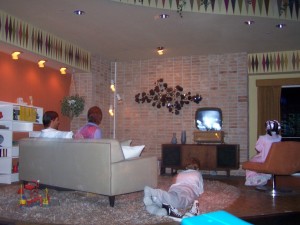
A modern den. Photo by Lisa Kline1 Used by permission. http://creativecommons.org/licenses/by-nc-nd/2.0/deed.en
Some time ago, I had occasion to Chat with a Young Person seeking admission to college. In the course of our conversation, the young man (learning that I was a philosopher) reported that he had recently written an essay on “Plato’s ‘Allegory of the Den.’” Even while nodding encouragement for him to tell me more about his essay, I did a little internal “heh, heh, heh. Allegory of the Den???? Was it wood paneled? Shag carpeting? Heh, heh. Den. Heh.”
And then I went home and looked on Google, where I learned that, in point of fact, students all across America are reading an excerpt from Plato’s Republic referred to in print as “The Allegory of the Den.”[1] So standard is this name that one can buy any number of (really-high-quality) essays discussing said excerpt about said den from any number of (no-doubt-really-reputable) web-based term-paper-sellers.[2] I mean, if you can buy a term paper written about it, it must be right…right?
Whatever. The name still makes me chuckle, conjuring up, as it does, an image of Yogi Bear[3] in a La-Z-Boy, drinking a cold one while watching reruns of “Married…With Children.” Flickering on the big screen television. On the wall. Of the den….
The Allegory of the Den
(with apologies to Plato, and to Benjamin Jowett, from whose translation I’ve shamelessly stolen)
Socrates: Behold! Human beings living in a split-level den, which has a mouth open towards the kitchen; here they have been from their childhood, and have their attention riveted so that they cannot move, and can only see before them, being prevented (by the allure of the commercials for cat food) from turning round their heads, and being rendered almost incapable of going into the kitchen to retrieve the popcorn from the microwave when the timer dings. Above and behind them a bright bulb is blazing at a distance, and between the bulb and the prisoners there is a large plastic and metal box; and you will see, if you look, a lens fitted into the box, of the sort that opticians grind for the visually impaired.
Glaucon: I see.
S: And do you see, I said, cables feeding into the box, carrying all sorts of products, and people and animals and buildings in digitized form? Some of them are selling cat food, others are telling you about their no-good children and still others are voting people off the island.
G: You have shown me a strange image, and they are strange prisoners.
S: Like ourselves, I replied; and they see only their own television shows, or the television shows of their fellow prisoners (which their fellow prisoners project whenever they gain control of the remote, which happens whenever a projectionist gets up to retrieve the popcorn after the timer has dinged, which is why the prisoners all are rendered incapable of getting up to fetch the popcorn), which the bright bulb throws on the opposite wall of the cave.
G: True, he said; how could they see anything but the television shows if they were prevented, by the interestingness of the cat food commercials, from moving their heads, and by the desire to control the remote, from getting up to retrieve the popcorn?
S: And if they were able to converse with one another, would they not suppose that they were describing the plot of the television shows they are watching, or the plot of the television shows that their fellow prisoners were watching? And would they not be inclined to mistake the plots of these television shows for reality, especially in the case of those shows in which people are telling you about their no-good children, and even more so in the case of those shows called “reality shows,” in which, nevertheless, some very unreal things happen, such as being voted off an island?
G: Very true.
S: And suppose further that the den had surround-sound speakers, would they not be sure to fancy when one of the television characters spoke, that the voice which they heard came from the character herself?
G: No question, he replied.
S: And would there be any particular incentive for leaving the den, if, say, the prisoners could just find someone who would be willing to bring in the popcorn when the timer dinged, and maybe also some seasonally-appropriate beverages, at regular intervals? Would there be any reason to leave, until, say, the batteries of the remote failed?
G: None, he agreed.
[1] Interestingly enough, Google turns up no references to the “Analogy of the Den,” despite the fact that the passage is often referred to as the “Cave Analogy” or “Analogy of the Cave.” Also interestingly, Wikipedia, our other inviolable source, doesn’t say anything about dens in its entry, “Allegory of the Cave”—though it does say that the analogy/allegory is sometimes called a myth or a parable.
[2] I am impressed to report that, in many of these papers-for-sale, a significant number of the words are spelled correctly!
[3] Yes, the two kinds of den have collided in my head, and Yogi is the inevitable result.
finally……plato makes sense